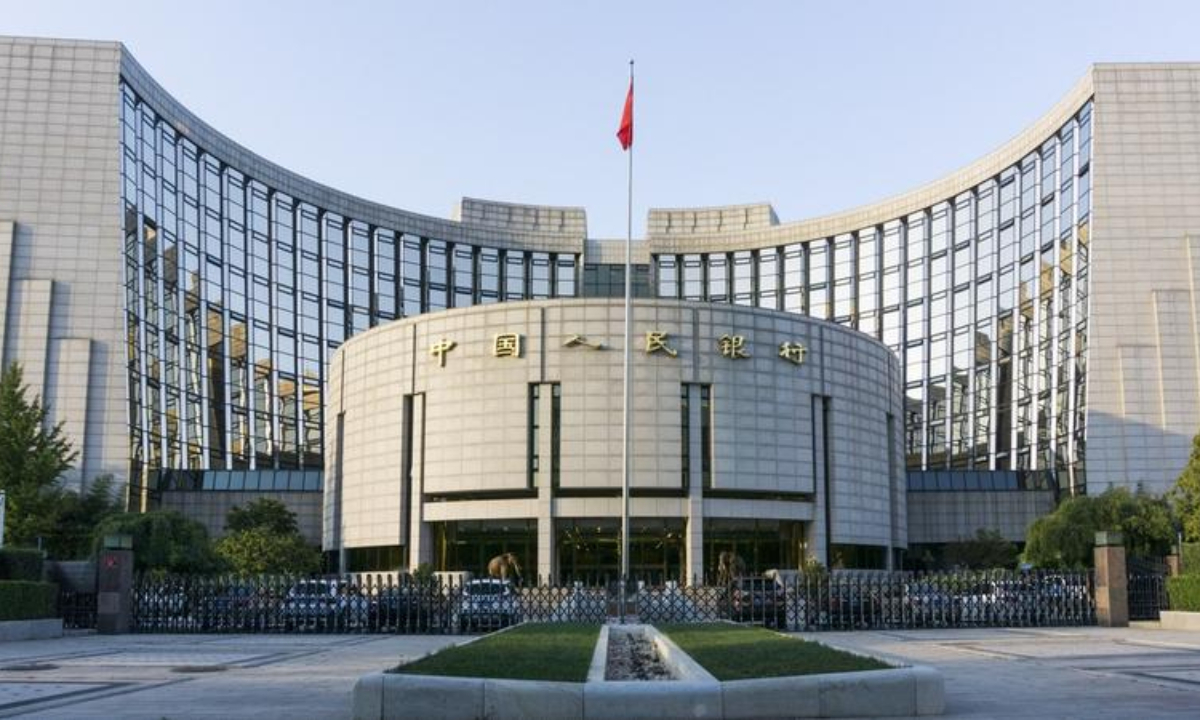Chinese banking shares rally despite global jitters arising from Credit Suisse’s woes
Prudent monetary policy protects lenders from external volatility: expert

The headquarters of the People's Bank of China in Beijing Photo: IC
Shares of Chinese banks largely rallied on Thursday, despite evolving bank woes in the US and Europe, following the distress of Credit Suisse that day before, which sent a shock wave across global markets.
The Bank of China, a state-owned lender, rose to its five-year high during trading on Thursday and closed 2.95 percent higher, while shares of China CITIC Bank went up 2.53 percent.
In Europe, the contagion of a deepening banking crisis continued to spread, although it eased after Credit Suisse said on Thursday that it would borrow 50 billion Swiss francs ($54 billion) from the Swiss central bank to shore up its liquidity.
Inspired by the news, Credit Suisse's US shares rose more than 20 percent in pre-market trading. The bank's statement came after Swiss financial authorities assured the market, saying that the bank met capital and liquidity requirements.
The Swiss Financial Market Supervisory Authority (FINMA) and the Swiss National Bank (SNB), the central bank, said in a joint statement on Wednesday that "there are no indications of a direct risk of contagion for Swiss institutions due to the current turmoil in the US banking market."
FINMA confirmed that Credit Suisse meets the higher capital and liquidity requirements applicable to systemically important banks.
FINMA and the SNB are following developments very closely and are in close contact with the Federal Department of Finance to ensure financial stability.
The values of Credit Suisse's shares and debt issues have been affected by market reactions in recent days, as the fears it sparked added to concerns of a global financial crisis following the collapse of Silicon Valley Bank (SVB) and Signature Bank, two mid-sized banks in the US.
Shares of Credit Suisse on Wednesday plunged to an all-time low after the chair of the Saudi National Bank, which bought a 9.8 percent stake in Credit Suisse last year, said it will not provide the Swiss bank with any more financial assistance due to regulatory restrictions.
European bank shares were pummeled as a large number of banks in Europe hold claims on Credit Suisse.
Market concerns about the solvency of major banks "are overdone", as strong capital positions coupled with tight regulation of systemically important banks keep major banks from experiencing solvency problems, according to views by the Chief Investment Office of UBS Global Wealth Management.
Some banks in Europe and US have liquidity problems against the backdrop of high interest rates," yet this kind of liquidity problem is not universal, and it is unlikely to cause systemic risks," said Li Xunlei, chief economist at Zhongtai Securities.
It's unclear if the rescue measures in the West will ease market fears and strengthen investor confidence, Dong Ximiao, chief researcher at Merchants Union Consumer Finance Co, told the Global Times on Thursday.
Anxiety about bank stocks will not be necessary in the Chinese market as the latter is largely immune from external volatility due to limited direct correlation with the West and the country's steady monetary policy, experts said.
"Judging from China's overall interest rate environment, the asset-liability structure of the banks, as well as the steady and healthy monetary policy, there will be no bank stock crisis," Dong said.
In a media briefing in early March, People's Bank of China Governor Yi Gang said that monetary policy will be stable this year, and interest rates are at a relatively appropriate level, and the country's inflation will remain under control.
Li told the Global Times that Chinese lenders do not have capital adequacy problem thanks to strict regulation. The liquidity of China's commercial banks is largely sufficient, and liquidity management is always in place, he added.
"Unlike SVB's large US Treasuries purchases, domestic banks have a small proportion of bond investment, and they mainly support the real economy in the form of issuing credit," Li said.
Whenever overseas stock markets are wildly volatile, China's capital market will be attractive for foreign investors, and before long, it is poised to be a haven for global investors, Li noted.



